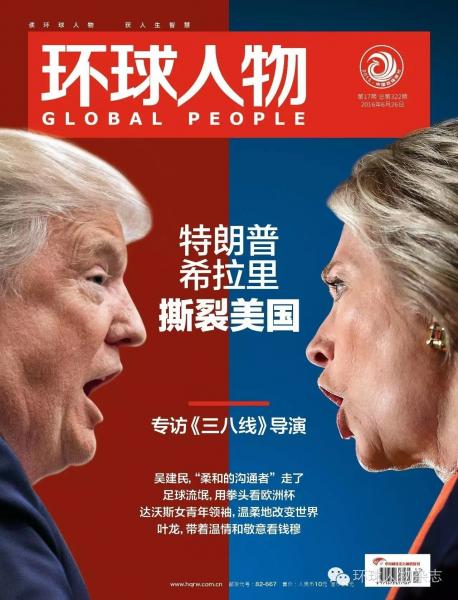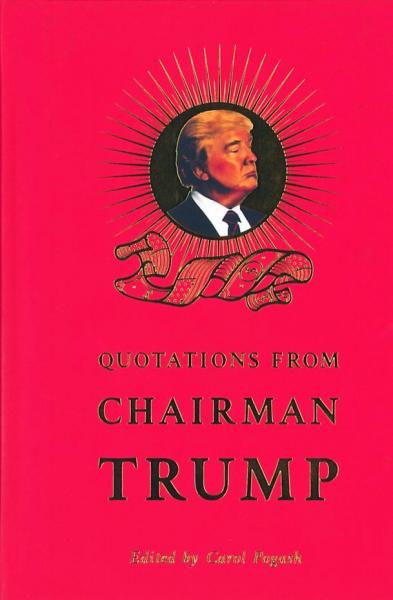skip to the calendar | policy options | personnel choices
On January 20, 2017 Donald Trump will become the president of the United States. America’s relationship with China came up repeatedly during his campaign, first with other candidates for the Republican nomination and then in his battle with Democratic nominee Hillary Clinton. In-depth discussion was rare. We’ll look at what Trump and the Republican party have said in a moment. A quick look, though, at how he won hints at attitudes toward China.
 |
| Illustration from 环球人物 Global People. |
About 120 million Americans voted. Hillary Clinton received about 240,000 more votes than Donald Trump. But as many around the world are surprised to learn, the U.S. election is really 51 separate contests with each state’s election carried out according to its own procedures and supervised by its own personnel. In most states and the District of Columbia, electoral college votes are awarded on a winner take all basis. Trump won at least 31 of those contests, taking at least 290 of the available 538 electoral college votes. (In Michigan, Trump has a slight lead and in New Hampshire, Clinton has a slight lead. Their 20 combined electoral college votes won’t change the outcome of the election.)
Few anticipated this outcome. For example, the last pre-election day analysis by the Associated Press expected Clinton to win fairly easily, with at least 274 electoral college votes and probably well over 300. What pollsters and analysts seem to have missed was the intensity of Trump’s support. Though Clinton outspent Trump in advertising ($376 million to $90 million as of Nov. 5) and in building a get-out-the-vote machine, a larger share of Trump’s supporters went to vote and seem to have encouraged like-minded friends and neighbors to do so as well. This seems to have especially been the case in rust belt states and in places such as Florida and North Carolina. Older white voters were key to Trump’s success, even though they make up a shrinking share of the total electorate. Voters over 45 favored Trump by 53% to 45%. Millennials (age 18 to 35) favored Clinton by an even larger margin, but the vast majority of America’s 69 million millennial citizens did not vote. (Click here for our #MillennialMinds conference.)
The ugliness of this campaign and the profound “unfavorability” ratings of Clinton and Trump were highlighted in China’s state-led media, which used it and
 |
| Cover of Global People, a People's Daily publication. |
Trump’s lack of previous government experience as reasons why democracy is not suited for China. Earlier government-funded videos have celebrated China’s “meritocratic” system highlighting Xi Jinping’s rise from a county-level post to General Secretary of the Communist Party. That video neglects to mention that Xi’s father joined the Party in 1928, was a close ally of Mao’s for decades, and was entrusted by Deng Xiaoping with overseeing the first special economic zone in Shenzhen. State media, however, has repeatedly suggested that Trump’s business pragmatism will cause him to find ways to collaborate for the mutual benefit of the two countries. In reporting Xi’s first post-election conversation with Trump, state media noted Xi said there was “huge potential” in cooperation. Trump’s office said the two “established a clear sense of mutual respect for one another.”
 Of course China was a sometimes hot topic on the campaign trail in the Trump-Clinton debates. He argued China was “stealing our jobs; they’re beating us in everything; they’re winning, we’re losing.” In September and October, we gathered Trump and Clinton’s China-related debate charges and pledges together along with those made in presidential debates going back to 1960. Click here to read those.
Of course China was a sometimes hot topic on the campaign trail in the Trump-Clinton debates. He argued China was “stealing our jobs; they’re beating us in everything; they’re winning, we’re losing.” In September and October, we gathered Trump and Clinton’s China-related debate charges and pledges together along with those made in presidential debates going back to 1960. Click here to read those.
In the platforms they develop for each presidential race, political parties outline their priorities and the policies they intend to implement. Since the parties are not invented anew each four years, many of their core positions go relatively unchanged from year to year. In the Republican Party platforms excerpted here, there is considerable continuity, particularly in arguing for stability in the Taiwan strait and in stating flatly that if China were to unilaterally upset the status quo and use force against Taiwan, the U.S. would aid Taiwan under the Taiwan Relations Act (1979). In these documents, the Republican Party emphasizes its interest in trade with China and collaboration when possible, but the Party also insists that American interests are harmed by Chinese currency manipulation, theft of intellectual property, limits on access to the some parts of China's market and tolerance for nuclear weapons proliferation, particularly by North Korea. At various times, the Party will also condemn China's family planning program, restrictions on religious practice, and the treatment of Tibetans and other ethnic minorities. In recent platforms, the Republicans have noted China's military build-up and complained of China's actions in the South China Sea. In the most recent platform, adopted in July 2016, the Republican Party wrote that "China's behavior has negated the optimistic language of our last platform concerning our future relations with China." What followed was a pointed list of actions that the Party takes exception to, including a revival of Maoism. Ultimately, however, the Party calls for continued, but open-eyed, engagement with China, so that Chinese can see "how real democracy works." Click here to read China-centered excerpts from the Republican 2016 platform (and earlier platforms).
Personnel Choices
To the extent that Trump had a get out the vote effort, it was organized by the Republican National Committee headed by Reince Priebus. On Monday, Trump announced Priebus would be his Chief of Staff. Priebus is close to House Speaker Paul Ryan and has headed the RNC since 2010. Priebus has visited Taiwan several times, including last year when he met with President Ma Ying-jeou and then candidate and now President Tsai Ing-wen. In 2011, Priebus wrote that Chinese ownership of American debt was a problem because, "And at the end of the day, an economy that is controlled by China cannot possibly compete with China."
Among those reportedly being considered for Secretary of Defense is former Missouri Senator Jim Talent. He is currently in the midst of a two year term on the U.S.-China Economic and Security Commission. He served in the House of Representatives 1993-2001 and the Senate 2001-2007. He lost to Democrat Claire McCaskill and subsequently worked at the Heritage Foundation and has been on several Defense review committees. He was an advisor to Mitt Romney’s in his 2008 and 2012 presidential campaigns. He advised Scott Walker during his brief campaign in 2015. He’s written about the importance of the South China Sea, the rebalancing to Asia, and other issues. He’s argued that much greater investment is needed in order to have a Navy capable of defending U.S. interests in the region.
We'll be following the incoming administrations pronouncements regarding China and East Asia closely. Thank you for reading and for sharingTalking Points with others.
Please support the USC U.S.-China Institute with a tax-deductible donation. We are eager to continue our efforts to inform public discussion of the multi-threaded and always changing U.S.-China relationship. We need your help.
Best wishes,
Keep us out of your spam/promotion folder - add uschina@usc.edu to your address book.
November 17, 2016; 4-6:00 PM
USC Campus, Wallis Annenberg Hall, ANN 106
Free, please register.
The USC U.S.-China Institute presents a screening of Iron Moon, a documentary following Chinese workers who use poetry as a tool to express the hidden life stories and experiences of people living at the bottom of the society. The film is in Chinese with English subtitles.
November 15, 2016 - 4:00pm
Berkeley, California
The UC Berkeley Center for Chinese Studies welcomes Professor Vivienne Shue analyzing political change in China from a new frame of mind.
Screening - Honor And Duty: The Mississippi Delta Chinese
November 17, 2016 - 7:00pm
Varies cities, California
Honor and Duty: The Mississippi Delta Chinese is a documentary that examines a little known aspect of the Chinese American experience. Writer, director and producer E. Samantha Cheng will be on hand to introduce the film and conduct a Q&A following the screening.
Screening - Mr. Deng Goes to Washington
November 20, 2016 - 2:30pm
La Jolla, California
This riveting documentary tells the story of Deng Xiaoping's historic visit to the U.S. in 1979 that changed the trajectory of U.S.-China relations and the world. The film screening will be followed by conversation about the historical role of Deng and U.S.-China relations post-election.
Muban, Chinese WoodBlock Color Printing
November 21, 2016 - 4:00pm
Los Angeles, California
The UCLA Center for Chinese Studies presents a talk by Wang Chao from the China National Academy of Art and David Barker from Muban Educational.
The Huang Family of Block Cutters: The Thread that Binds Late Ming Pictorial Woodblock Printmaking
November 22, 2016 - 7:30pm
San Marino, California
David Barker, professor of printmaking at the China National Academy of Fine Arts in Hangzhou, will consider the important contributions made to Chinese pictorial printing by the famous Huang family of artisan block cutters.
November 15, 2016 - 12:00pm
Ann Arbor, Michigan
The University of Michigan Center for Chinese Studies presents a talk by R. Bin Wong, Distinguished Professor of History, UCLA.
What Remains: Coming to Terms with Civil War in 19th century China
November 15, 2016 - 3:30pm
Seattle, Washington
The University of Washington East Asia Center presents a book talk by Professor Tobie Meyer-Fong.
The Family and Demographic Revolutions in Taiwan
November 15, 2016 - 4:00pm
New York, New York
The Columbia University Weatherhead East Asian Institute presents a talk by Ying-Chang Chuang, Academia Sinica as part of their Modern Taiwan Lecture Series.
November 26, 2016 - 1:30pm
Washington, D.C.
The Freer|Sackler Museum of Asian Art presents a screening of Stage Sisters.
Film Screening: A Better Tomorrow
November 26, 2016 - 4:00pm
Washington, District of Columbia
The Freer|Sackler Museum of Asian Art presents a screening of John Woo's A Better Tomorrow.
November 29, 2016 - 12:00pm
Ann Arbor, Michigan
The University of Michigan Center for Chinese Studies presents a talk by Jinhua Chen, Professor of East Asian Buddhism, The University of British Columbia.
Taiwan's Popular Culture and its Impact on China, East Asia, and Beyond
November 29, 2016 - 4:00pm
New York, New York
The Columbia University Weatherhead East Asian Institute presents a talk by Marc Moskowitz, University of South Carolina as part of their Modern Taiwan Lecture Series.




